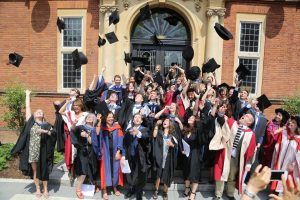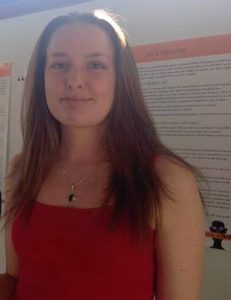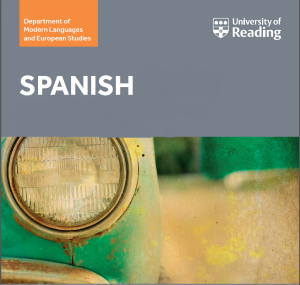Another year, another cohort, another graduation ceremony. What is unchanged is our happiness to be celebrating our students’ present achievements and our excitement at the thought of their future achievements, all accompanied by that touch of sadness at seeing them go. Graduation is also the opportunity for us to meet our students’ families, and rejoice with them on such a special occasion. This year we had the extreme pleasure of meeting the family of one very special student, James Dowds, who graduated in French and Italian, winner of the 2017 Welson Prize for Italian, as well as of the Student of the Year award for being one of the most engaged students of his year, a true example of active participation, citizenship, and resilience. This is what his mother, Dympna Mc Donnell, had to say about James’s – and her own – experience (including the ‘bumps’) during the years here at Reading:

Photograph courtesy of Cre8ive studios http://www.cre8ive-studios.com
As a parent it is difficult to support a child through university as there is little contact with the university and the student is away from home. I was also very aware that in supporting James from afar, it was important that he learned the skills and techniques he needed to get him through difficult times. Whilst this was a challenge in years 1 and 2 it became more difficult in his year away. All students find coping away from home challenging and James was not unusual in feeling lonely and homesick. In his first week away in France I know he contacted you (as indeed I did as I was concerned about how low he was feeling). The university was quick to respond in making contact with James and giving him the advice he needed. I know that in both France and Italy James was helped by lecturers and staff in Reading. Without this support I think he may have questioned if the trip abroad was a worthwhile and manageable event for him. In fact, the support James received was key in making the year abroad the success it turned out to be. In France, he made many friends and had a thriving social life. I went out to see him with his brother and sister in October 2015 and was so impressed with the quantity of local knowledge he had accumulated. He guided us around Poitiers, showing us many lovely churches and courtyards and was clearly happy and relaxed.
On graduation day, the department’s lecturers remarked that James returned back to Reading for his fourth year with a very different attitude and approach towards his studies. He had matured in his time away and dealt with many issues that were making him unhappy. He felt more confident in his ability to deal with the challenges life presents us with. He worked hard at his studies and secured the 2.1 degree he wanted to get. He got involved with extra curricular events such as the radio show and the video promoting foreign languages. He was much more positive and wanted to do well.
To the department I would like to say: never forget or underestimate the profound positive impact you and your colleagues have on the young people who are so lucky to have you. Imparting knowledge, preparing and delivering lectures is such a big part of what you all do but it is very clear to me that you provide so much more to your students. You reassure, listen and support. Alongside that pastoral care, you set high academic standards, which ensure students, reach their potential. I have no doubt whatsoever that your care and your professional skills were key to James’s success.
Dympna McDonnell
















 Lucia Crowther graduated in 2015 with a degree in Italian and History of Art. An excellent and committed student throughout her degree, Lucia was the recipient of the Meneghello-Italianist UG Prize for outstanding academic achievements in Italian Studies. Her dissertation entitled ‘The architectural formalisation of pilgrimage in the portico of the Madonna di San Luca’ was awarded the prestigious British-Italian Society Memorial Rooke Prize for the best UG dissertation in Italian Studies in 2016.
Lucia Crowther graduated in 2015 with a degree in Italian and History of Art. An excellent and committed student throughout her degree, Lucia was the recipient of the Meneghello-Italianist UG Prize for outstanding academic achievements in Italian Studies. Her dissertation entitled ‘The architectural formalisation of pilgrimage in the portico of the Madonna di San Luca’ was awarded the prestigious British-Italian Society Memorial Rooke Prize for the best UG dissertation in Italian Studies in 2016. Class of 2015 graduates from those disciplines are employed at higher rates than their cohorts in the class of 2014, and starting salaries rose significantly, according to the National Association of Colleges and Employers’ annual first-destination survey of recent graduates in the workforce.
Class of 2015 graduates from those disciplines are employed at higher rates than their cohorts in the class of 2014, and starting salaries rose significantly, according to the National Association of Colleges and Employers’ annual first-destination survey of recent graduates in the workforce.

 In Mexico, both 31st October and 1st November are big celebrations. Dr Catriona McAllister, who teaches Latin American history and culture, describes Día de muertos traditions for us: ‘On 2nd November (coinciding with the Catholic festival of All Souls Day), Mexico celebrates the Day of the Dead. The festival offers the opportunity to remember and honour departed loved ones and has its origins in pre-Hispanic traditions that were later combined with Catholic practices. Celebrations can take place over several days, and it is traditional to visit cemeteries where loved ones are buried and to prepare an altar at home. Altars usually contain a range of objects including flowers (particularly cempasúchiles, or marigolds), the favourite food of the departed loved one, candles, objects belonging to the departed, photos and decorated sugar skulls’.
In Mexico, both 31st October and 1st November are big celebrations. Dr Catriona McAllister, who teaches Latin American history and culture, describes Día de muertos traditions for us: ‘On 2nd November (coinciding with the Catholic festival of All Souls Day), Mexico celebrates the Day of the Dead. The festival offers the opportunity to remember and honour departed loved ones and has its origins in pre-Hispanic traditions that were later combined with Catholic practices. Celebrations can take place over several days, and it is traditional to visit cemeteries where loved ones are buried and to prepare an altar at home. Altars usually contain a range of objects including flowers (particularly cempasúchiles, or marigolds), the favourite food of the departed loved one, candles, objects belonging to the departed, photos and decorated sugar skulls’. We are very pleased to announce that we have launched a Single Honours degree in Spanish and Latin American Studies, starting from September 2017!
We are very pleased to announce that we have launched a Single Honours degree in Spanish and Latin American Studies, starting from September 2017!